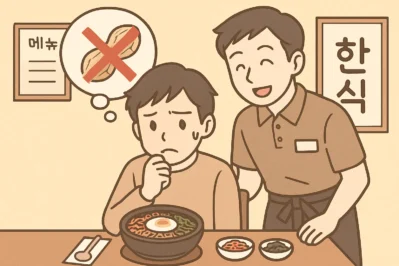Eat Worry-Free in Korea! Essential Phrases
Hello! Welcome to Maeil Hangeul, here to upgrade your Korean skills!
Have you ever looked at a Korean menu and felt a little nervous? You see a delicious-looking dish, but you have an allergy or a dietary restriction. What if it has meat? What if it has nuts? Don’t worry! Today, we’re going to learn the essential phrases to ask about ingredients so you can order with confidence.
Lately in Korea, healthy eating and veganism are huge trends! Even K-pop idols are sharing their plant-based diets, making it cooler than ever to be conscious of what you eat. This means restaurants are becoming more accommodating. With these key phrases, you’ll be ready to navigate any Korean restaurant like a pro!
Key Expressions You Need to Know
Here are the absolute must-know phrases for talking about ingredients.
1. 이거 … 들어가요? (Igeo … deureogayo?)
* English Meaning: Does this have … in it?
* Detailed Explanation: This is the most important and versatile question you can learn for ordering. It’s a polite and simple way to ask if a specific ingredient is in your dish. Just place the name of the ingredient you’re concerned about in the blank space!
* Vocabulary to use:
* 고기 (gogi): meat
* 돼지고기 (dwae-ji-gogi): pork
* 해산물 (hae-san-mul): seafood
* 유제품 (yu-je-pum): dairy products
* 땅콩 (ttang-kong): peanuts
2. … 빼주세요. (… ppae-juseyo.)
* English Meaning: Please leave out … / Please remove …
* Detailed Explanation: This is your magic phrase for making special requests. If you find out a dish contains something you don’t want, you can use this polite expression to ask for it to be removed. “주세요” (juseyo) means “please give me,” and “빼다” (ppaeda) means “to remove” or “to take out.”
3. 저는 … 못 먹어요. (Jeo-neun … mot meogeoyo.)
* English Meaning: I can’t eat …
* Detailed Explanation: This is a clear and direct way to state your dietary restriction. “저는” (jeoneun) means “I,” and “못 먹어요” (mot meogeoyo) means “cannot eat.” It’s very useful for explaining allergies or strong preferences. The staff will understand that you need to avoid this ingredient completely.
Example Conversation
Let’s see how these phrases work in a real-life situation. Imagine you’re at a trendy restaurant in Seoul famous for its modern Bibimbap.
- Server (A): 어서 오세요! 주문하시겠어요? (Eoseo oseyo! Jumun-hasigesseoyo?)
(Welcome! Are you ready to order?) - You (B): 네. 이 비빔밥에 고기 들어가요? (Ne. I bibimbap-e gogi deureogayo?)
(Yes. Does this bibimbap have meat in it?) - Server (A): 아니요, 그건 채식 비빔밥이라 고기 안 들어가요. 하지만 계란이 올라가요. (Aniyo, geugeon chaesik bibimbap-ira gogi an deureogayo. Hajiman gyeran-i ollagayo.)
(No, that’s a vegetarian bibimbap, so it doesn’t have meat. But it comes with an egg on top.) - You (B): 아, 그래요? 저는 계란 못 먹어요. 계란은 빼주세요. (A, geuraeyo? Jeoneun gyeran mot meogeoyo. Gyeran-eun ppae-juseyo.)
(Oh, really? I can’t eat eggs. Please leave out the egg.) - Server (A): 네, 알겠습니다. 계란 빼고 준비해 드릴게요! (Ne, algesseumnida. Gyeran ppaego junbihae deurilgeyo!)
(Yes, I understand. I will prepare it for you without the egg!)
See? Simple and effective!
Culture Tip & Trend Deep Dive
The “healthy living” wave in Korea is real! Influencers and celebrities on shows like “I Live Alone” (나 혼자 산다) often showcase their specific diets, from veganism to low-carb meals. This has made the general public much more aware of different dietary needs.
However, be aware of “hidden” ingredients!
* Kimchi (김치): Traditional kimchi is often made with fermented fish sauce (젓갈, jeotgal) or tiny shrimp. If you’re a strict vegan, it’s always good to ask if they have a vegan kimchi option!
* Broth (국물/육수): Many delicious Korean soups and stews (찌개, jjigae) that look like they are just vegetables might use a meat or anchovy-based broth (육수, yuksu).
Using the phrase “이거 … 들어가요?” for these specific items will show you have a deeper understanding and ensure your meal is perfect for you.
Let’s Practice!
Time to check what you’ve learned. You can do it!
- Fill in the blank: You are allergic to peanuts and want to order a dessert. How do you ask if it contains peanuts?
- 이거 ______ 들어가요? (igeo ______ deureogayo?)
- Make a sentence: You don’t like onions (
양파, yangpa). How would you ask for them to be removed from your food?- ____________________.
Great job today! You are now equipped to order food in Korea while taking care of your dietary needs. Be brave and try using these phrases on your next restaurant visit!
Leave a comment below using the phrases we learned! What’s an ingredient you can’t eat? Tell us by writing, “저는 ______ 못 먹어요.”






